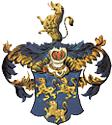Fritz Harney
Fritz Harney (born March 24, 1879 in Koenigsberg in the Neumark , † December 15, 1953 in Berlin ) was a German industrialist and functionary .
Life
Fritz Harney was the son of a car manufacturer. He attended the humanistic grammar school in his hometown Königsberg in the Neumark and first studied the metallurgy subject at the Bergakademie Clausthal , where he was a member of the Corps Montania , then physics , chemistry and economics in Berlin. In 1905/06 he became a chemist at the Wierzchoslawice sugar factory near Hohensalza, in 1906 assistant at the Stöbnitz sugar factory, in 1908 operations manager at the Friedrichsthal sugar factory, and in 1910 director of the Wabern share sugar factory in Hesse . From 1916 to 1945 he was general director of the AG Zuckerfabrik Nauen and also managed industrial subsidiaries as well as agricultural and forestry goods. He took over the chairmanship of numerous professional associations in the mid-twenties. Fritz Harney distinguished himself as a committed chairman of the Economic Association of the German Sugar Industry .
With the sugar overproduction that occurred after the First World War in 1918, he got involved in international negotiations with committed negotiating skills and a fair willingness to compromise on the allocation of sugar cultivation, processing and export.
During these negotiations in 1931 he signed the Brussels Chadbourne Agreement , which was important for the sugar industry and in which the control of sugar production was regulated in line with the market. In 1938 he resigned as head of the sugar industry economic group for health reasons. His successor was Robert Aumüller . After the expropriation in the Soviet occupation zone, he moved to Berlin, where he died in 1953.
literature
- Fritz Harney in memory . In: sugar. Magazine for sugar beet growing - sugar industry - yeast industry 1/1954, pp. 19–21
- Friedrich Th. Meyer: Harney, Fritz Gustav Erich. In: New German Biography (NDB). Volume 7, Duncker & Humblot, Berlin 1966, ISBN 3-428-00188-5 , p. 691 f. ( Digitized version ).
- Walther Killy, Rudolf Vierhaus (Herg.): German Biographical Encyclopedia . Volume 4. KG Saur Verlag, Munich 1996, p. 392
| personal data | |
|---|---|
| SURNAME | Harney, Fritz |
| BRIEF DESCRIPTION | German industrialist and functionary |
| DATE OF BIRTH | March 24, 1879 |
| PLACE OF BIRTH | Koenigsberg in the Neumark |
| DATE OF DEATH | December 15, 1953 |
| Place of death | Berlin |
